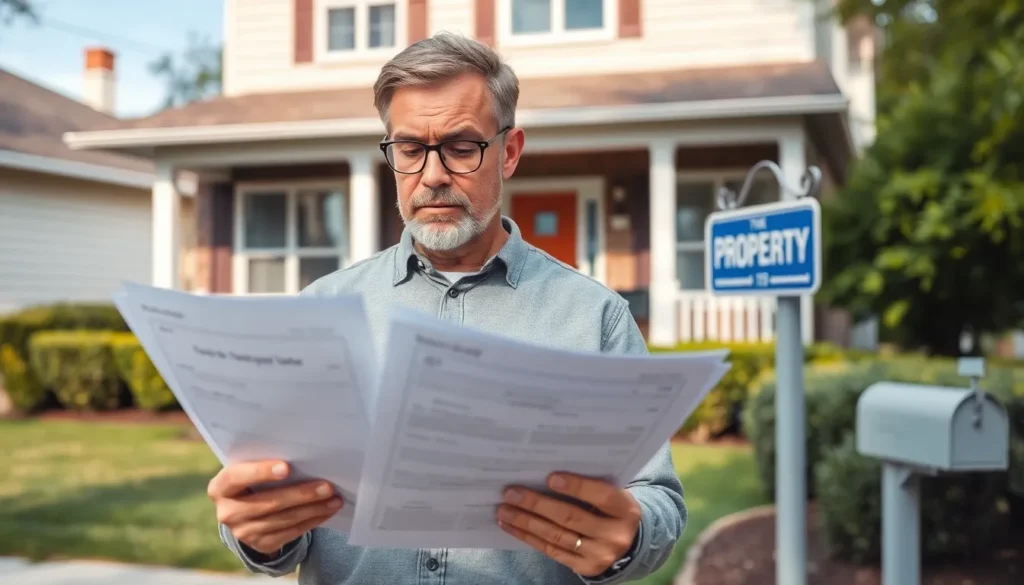Table of Contents
ToggleWhen it comes to property taxes, confusion often reigns supreme. Are they paid in advance? Or do homeowners just sit back and wait for the taxman to knock? Spoiler alert: it’s not as straightforward as one might hope. Understanding the timing of these payments can save homeowners from unexpected surprises and financial headaches.
Understanding Property Taxes
Property taxes represent a significant financial responsibility for homeowners. Clarifying their definition and importance ensures proper management and understanding of these taxes.
Definition of Property Taxes
Property taxes are levies imposed by local governments on real estate properties. They fund essential services like education, public safety, and infrastructure development. Assessment of property taxes occurs annually, based on property value determined by local tax assessors. Rates vary by jurisdiction and property type, contributing to unique tax bills for each homeowner. Understanding these definitions aids in grasping financial commitments associated with homeownership.
Importance of Property Taxes
Significant funding for local services comes from property taxes. They support schools, maintain roads, and provide emergency services. Reliable funding enables local governments to operate effectively and invest in community improvements. Timely payment of property taxes prevents penalties and keeps homeowners in good standing with local authorities. Awareness of these taxes also reinforces the homeowner’s role in community funding and development.
Are Property Taxes Paid in Advance?

Property taxes often confuse homeowners regarding when payments occur. Many local jurisdictions require payment for the upcoming year based on current assessments.
Timing of Property Tax Payments
Tax payments typically follow an annual cycle. Homeowners receive property tax bills based on assessments conducted by local authorities. Payments may be due at the end of the year or in early installments. Some regions permit quarterly payments, alleviating financial strain. Homeowners must know their jurisdiction’s specific due dates to avoid penalties.
Common Payment Structures
Commonly, property taxes feature flat-rate structures based on assessed property values. Some areas implement a tiered system where tax rates vary according to property value. Factors like exemptions for veterans or seniors affect final tax amounts. Many municipalities offer flexible options, including online payment and automatic deductions. Such arrangements help homeowners manage their tax obligations efficiently.
Factors Influencing Property Tax Payment Schedules
Several elements influence the timing and structure of property tax payments. Understanding these factors ensures homeowners manage their obligations effectively.
Local Regulations
Local regulations play a significant role in determining property tax payment schedules. Jurisdictions establish specific laws governing when taxes are due and how they can be paid. Some areas require payments annually, while others may allow semi-annual or quarterly arrangements. In addition, regulations dictate potential penalties for late payments, reinforcing the importance of adhering to set deadlines. Homeowners benefit from familiarizing themselves with their locality’s rules to avoid unexpected fees or complications.
Property Assessment Values
Property assessment values directly impact the amount owed in property taxes. Local assessment authorities evaluate properties based on various criteria, including market trends and comparable sales. Higher assessed values generally lead to increased tax bills, affecting payment schedules. Homeowners should periodically review property assessments to ensure accuracy, as discrepancies can result in inflated tax obligations. Many localities offer mechanisms for disputing assessments, enabling property owners to challenge valuations that seem excessive.
Understanding property tax payment schedules is essential for homeowners. By knowing whether taxes are paid in advance or at the end of a cycle, they can better manage their finances and avoid potential penalties. Each jurisdiction has its own rules regarding payment timing and methods which can significantly affect a homeowner’s financial planning.
Staying informed about local regulations and regularly reviewing property assessments ensures that homeowners can navigate their tax obligations effectively. This proactive approach not only helps in maintaining good standing with local authorities but also supports community development through timely contributions to essential services.






